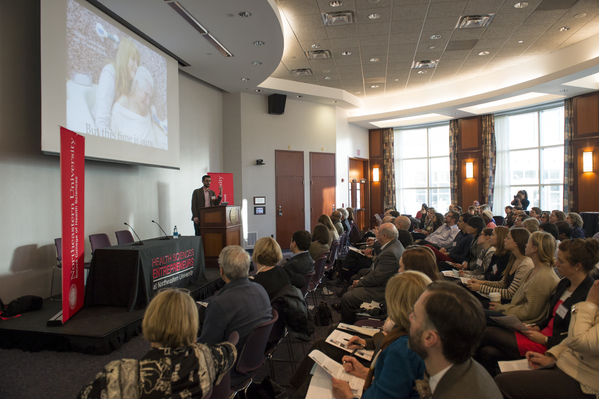Entrepreneurial opportunities in eldercare

A panel of experts on Wednesday discussed how the growing population of adults over 65 and advancements in technology present opportunities for entrepreneurs to bring much-needed innovations in eldercare.
Northeastern’s Health Sciences Entrepreneurs program and Aging 2.0, an organization dedicated to accelerating innovations to improve the lives of older adults worldwide, presented the event, which was held in the Raytheon Amphitheater. The distinguished panel of experts comprised Alice Bonner, an associate professor of nursing in the Bouvé College of Health Sciences; physician and social entrepreneur Andrey Ostrovsky, CEO and co-founder of Care at Hand; and Eugene Khazan, E’01, founder and CEO of BraveLeaf.
Bonner noted the need and opportunity to develop personalized innovations that ensure quality of life for both frail elderly adults and those with cognitive impairment. She said other opportunities exist to help caregivers and to design livable communities for people of all ages, not just communities for only older adults.
“We must improve care for older adults in all our communities,” she said.
Bonner is a leading expert in dementia care and played an integral role in Northeastern becoming the first academic partner of an Alzheimer’s disease initiative launched last year by the City of Boston.

Alice Bonner, an associate professor of nursing in the Bouvé College of Health Sciences and a leading expert in dementia care, speaks at the Health Sciences Entrepreneurs event. Photo by Brooks Canaday
She also highlighted the work being done by Northeastern faculty members Holly Jimison and Misha Pavel, whose research includes using unobtrusive in-home sensors to measure patterns of activity and infer cognitive function and health.
In his talk, Ostrovsky urged hopeful entrepreneurs to pursue opportunities in areas for which they have a strong passion or personal connection. “If you can channel that passion into the skill set of entrepreneurship, you can make a ton of money and do a ton of good,” he said.
His company, Care at Hand, is focused on reducing hospital readmissions, an area where he noted there is a great deal of wasteful healthcare spending due to care coordination breakdowns. The company developed a mobile- and web-based app that caregivers can use to help track and assess their patients’ health. The app prompts caregivers to ask elderly patients questions about their health, and the data collected over time can be used to evaluate and identify potential health problems before they occur.
The Health Sciences Entrepreneurs program, founded in 2005, was created to introduce entrepreneurial business opportunities in health sciences to students, faculty, and alumni. The program focuses on educating entrepreneurs by providing them with the knowledge and tools to build successful companies. It hosts annual events and in 2010 launched a mentoring program for Northeastern students, faculty, and alumni who are starting business in the health sciences.
Khazan, for his part, was selected for the HSE mentoring program in 2010 when he endeavored to develop a business to solve his grandparents’ problem of remembering to take their medication on time. His first idea was to develop a smart pill box. With the help of HSE, that idea evolved into BraveLeaf, an electronic care management company focused on serving assisted living communities.
“I pivoted and came up with a completely different product,” he said. “I started with a smart pill box you could buy in the store and ended up with an online software product. But it was still focused on the same need and I was still very excited about it.”
Khazan encouraged other entrepreneurs who decide to take their business ideas in a new direction to make sure their pivot is still toward an area that excites them. Otherwise, he said, it will be more challenging to remain interested.





